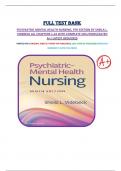FULL TEST BANK
PSYCHIATRIC MENTAL HEALTH NURSING, 9TH EDITION BY SHEILA L.
VIDEBECK ALL CHAPTERS 1-24 WITH COMPLETE SOLUTIONS|RATED
A+| LATEST 2024/2025
PRINTED PDF| ORIGINAL DIRECTLY FROM THE PUBLISHER| 100% VERIFIED ANSWERS|DOWNLOAD
IMMEDIETLY AFTER THE ORDER
,PSYCHIATRIC MENTAL HEALTH NURSING, 9TH EDITION BY SHEILA L. VIDEBECK
TABLE OF CONTENTS
UNIT 1 CURRENT THEORIES AND PRACTICE ................................................................................................. 3
Chapter 1, Foundations Of Psychiatric–Mental Health Nursing ............................................................... 3
Chapter 2, Neurobiologic Theories And Psychopharmacology .............................................................. 21
Chapter 3, Psychosocial Theories And Therapy ...................................................................................... 37
Chapter 4, Treatment Settings And Therapeutic Programs.................................................................... 56
UNIT 2 BUILDING THE NURSE – CLIENT RELATIONSHIP .............................................................................. 76
Chapter 5, Therapeutic Relationships ..................................................................................................... 76
Chapter 6, Therapeutic Communication................................................................................................. 96
Chapter 7, Client’s Response To Illness ................................................................................................ 118
Chapter 8, Assessment.......................................................................................................................... 133
UNIT 3 CURRENT SOCIAL AND EMOTIONAL CONCERNS .......................................................................... 152
Chapter 9, Legal And Ethical Issues....................................................................................................... 152
Chapter 10, Grief And Loss ................................................................................................................... 171
Chapter 11, Anger, Hostility And Aggression ........................................................................................ 193
Chapter 12, Abuse And Violence .......................................................................................................... 208
UNIT 4 NURSING PRACTICE FOR PSYCHIATRIC DISORDERS ...................................................................... 220
Chapter 13, Trauma And Stressor- Related Disorders .......................................................................... 220
Chapter 14, Anxiety And Anxiety Disorders .......................................................................................... 229
Chapter 15, Obsessive – Compulsive And Related Disorders ............................................................... 244
Chapter 16, Schizophrenia .................................................................................................................... 253
Chapter 17, Mood Disorders And Suicide ............................................................................................. 269
Chapter 18, Personality Disorders ........................................................................................................ 284
Chapter 19, Addiction ........................................................................................................................... 297
Chapter 20, Eating Disorders ................................................................................................................ 311
Chapter 21, Somatic Symptom Illnesses ............................................................................................... 324
Chapter 22, Neurodevelopmental Disorders ........................................................................................ 337
Chapter 23, Disruptive Behavior Disorders........................................................................................... 350
Chapter 24, Cognitive Disorders ........................................................................................................... 360
,PSYCHIATRIC MENTAL HEALTH NURSING, 9TH EDITION BY SHEILA L. VIDEBECK
UNIT 1 CURRENT THEORIES AND PRACTICE
Chapter 1, Foundations Of Psychiatric–Mental Health Nursing
1. The Nurse Is Assessing A Newly Admitted Client With Cholecystitis. When Performing The
Admission Assessment, Which Statement By The Client Is An Indicator Of Optimal Mental Health?
A. “I Don’t Need Anyone In My Life, I Manage Well On My Own.”
B. “I Practice Yoga Regularly Since It Helps Manage Any Stress I Am Feeling.”
C. “My Family Has Several People With Mental Health Problems.”
D. “I Had A History Of Alcohol Use Disorder And Have Been Sober For 2 Months.”
CORRECT ANS>>B
Rationale: Individual Factors Influencing Mental Health Include Coping Or Stress Management Abilities.
Interpersonal Factors Such As Intimacy And A Balance Of Separateness And Connectedness Are Both
Needed For Good Mental Health, And Therefore A Healthy Person Would Need Others For
Companionship. A Family History of Mental Illness Could Relate to the Biologic Makeup of an Individual,
Which May Have a Negative Impact on an Individual’s Mental Health. A Recent History Of The Use Of
Maladaptive Coping Mechanisms Such As Alcohol Does Not Indicate That The Client Is Mentally Healthy.
Question Format: Multiple Choice
Chapter 1: Foundations Of Psychiatric–Mental Health Nursing Cognitive Level: Apply
Client Needs: Safe And Effective Care Environment: Management Of Care Integrated Process:
Communication And Documentation
Learning Objective: 1
Reference: P. 2, Mental Health And Mental Illness,
2. The Nurse Is Performing An Admission Assessment For A Client Admitted To The Behavioral
Health Unit. Which Social/Cultural Category Will The Nurse Document That May Be Contributing To The
Client’s Degree Of Mental Illness? Select All That Apply.
A. The Client Is Unable To Find Work And Does Not Have Enough Money For Housing.
, B. The Client States That They Are Discriminated Against Due To Their Country Of Origin.
C. The Client Attributes Life’s Problems To Being Without Family Support.
D. The Client Reports Being Unable To Find Anything Meaningful Within Their Life.
E. The Client Reports Not Belonging Anywhere And Is Without Family Support.
CORRECT ANS>>A, B
Rationale: Social Or Cultural Categories Relate To A Lack Of Resources, Poverty, Negative View Of The
World, And Discrimination And May Result In Isolation And Violent Or Criminal Behavior. The Client That
Attributes Life’s Problems To Being Without Family Support Is Not Able To Find Meaning In Life. Being
Without Support Is Interpersonal Determinant Of Mental Illness.
Question Format: Multiple Select
Chapter 1: Foundations Of Psychiatric–Mental Health Nursing Cognitive Level: Analyze
Client Needs: Safe And Effective Care Environment: Management Of Care Integrated Process: Nursing
Process
Learning Objective: 1 Reference: P. 2, Mental Illness
3. A Client Grieving The Recent Loss Of A Spouse, Asks, “Am I Becoming Mentally Ill? I Feel So Sad”
Which Is The Nurse’s Best Response?
A. “You May Have A Temporary Mental Illness Because You Are Experiencing So Much Pain.”
B. “You Are Not Mentally Ill. This Is An Expected Reaction To The Loss You Have Experienced.”
C. “Were You Generally Dissatisfied With Your Relationship Before Your Husband’s Death?”
D. “Try Not To Worry About That Right Now. You Never Know What The Future Brings.”
CORRECT ANS>>B
Rationale: Acute Grief Reactions Are Expected And Therefore Not Considered Mental Illness.
Downplaying The Client’s Grief Does Not Appropriately Address The Client’s Concerns. The Quality Of
The Relationship Does Not Determine The Presence Of Absence Of Mental Illness.
Question Format: Multiple Choice




